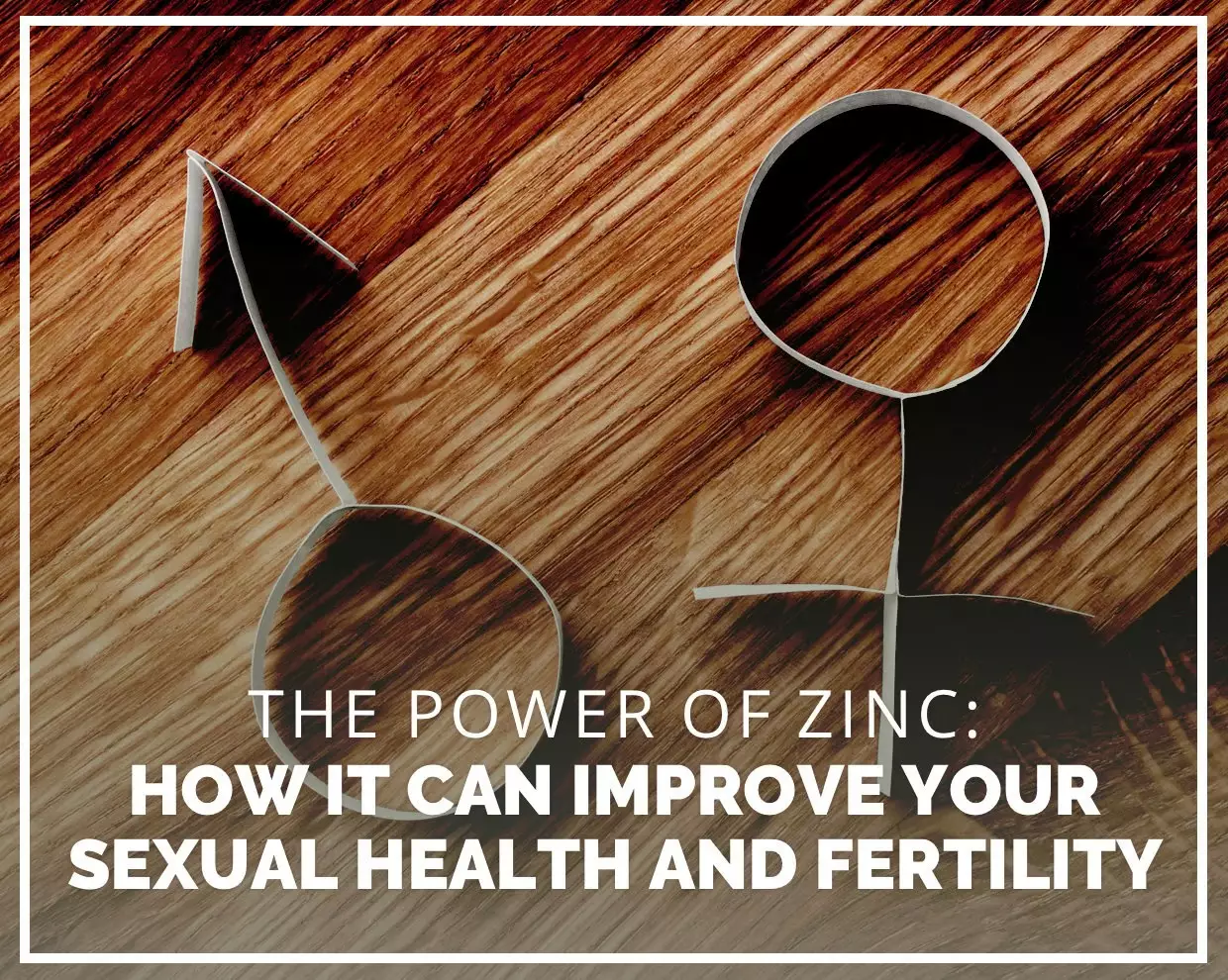Sexual health and fertility are important aspects of our overall well-being; however, countless men and women struggle with various issues, particularly on the path of pursuing a family. Low libido, erectile dysfunction, and infertility can be caused by multiple factors, including stress from a high-performing lifestyle, choosing fast and convenient prepackaged foods, and nutrient deficiencies from unripe produce and mass-produced products. One easily overlooked essential mineral crucial in addressing these issues is zinc.


What is Zinc?
Zinc is an important dietary trace mineral for human health. It was first recognised as an essential nutrient (a nutrient that the body cannot produce or make in adequate amounts on its own and must be obtained through diet or supplements) in the 18th century and has been extensively studied for its role in various physiological processes ever since. You may be familiar with zinc in the form of sunscreens, bandages, ointments and wound healing creams, batteries, or paint but zinc is also fundamentally involved in over 300 enzymatic reactions in the body, including those related to growth, development, and reproduction, making it great for whole-body health and vitality. [1][2] Zinc is the 24th most abundant element in Earth's crust and is found in small amounts in almost all living organisms.
So, how does zinc play a crucial role in sexual health and fertility for both men and women?
Benefits of Zinc for Men and Women
In men, zinc is essential for sperm production and maturation. Studies have shown that zinc deficiency can lead to decreased sperm quality and quantity and low testosterone levels. In women, zinc helps regulate the menstrual cycle and ovulation. Zinc deficiency has been linked to infertility and poor pregnancy outcomes.


Let's unpack the secrets of zinc in the discussion below.
Boost Ovulation
Zinc is vital for the normal functioning of the hypothalamus and pituitary gland, which are responsible for regulating the production of hormones such as follicle-stimulating hormone (FSH) and luteinising hormone (LH). FSH and LH are produced by the pituitary gland and are responsible for stimulating the growth of the ovarian follicle, which contains the egg. They also play a role in triggering ovulation, which is the release of the egg from the ovary. When zinc levels are low, it can disrupt the pituitary gland's normal functioning, making it more difficult for the ovary to release an egg, affecting the regularity of the menstrual cycle.


Increase Chances of Pregnancy
Zinc can help support the maturation of eggs, and studies have shown that zinc supplementation can improve the quality of eggs in several ways. Firstly, zinc is necessary for the proper synthesis of DNA, the genetic material that carries the instructions for the development and functioning of all living organisms. Zinc helps in the proper replication and transcription of DNA so cell division integrity is maintained.[3] This can help increase the chances of successful fertilisation and conception. Secondly, eggs are particularly susceptible to oxidative stress because they are large cells with a high amount of lipids, which are vulnerable to oxidative damage. Zinc acts as an antioxidant by neutralising free radicals, which can help to reduce the damage caused by oxidative stress.
Lastly, zinc also helps to support the activity of other antioxidants, such as Superoxide dismutase (SOD) and Glutathione peroxidase (GPx). It does this by providing a better antioxidant defence system to help improve the maturation and overall quality of the eggs.[4][5]
ED Treatment (Erectile Dysfunction)
According to a recent study, it is estimated that around one in five men in the UK experience ED at some point in their lives. It has also been suggested that the prevalence of ED increases with age, with over 40% of men over 40 experiencing ED. [8] However, it's important to note that ED can affect men of all ages, which is not a normal part of ageing. Zinc can help by reducing inflammation and keeping the blood vessels healthy and functioning optimally. This can help to improve blood flow to the penis, which is necessary for an erection. Additionally, zinc can help reduce inflammation-related oxidative stress, which can cause damage to the blood vessels and contribute to ED.
Zinc also plays a role in maintaining healthy blood vessels by regulating the activity of enzymes that are involved in the production of nitric oxide, a substance that is necessary for proper blood vessel function. Nitric oxide helps to relax the smooth muscles that line the blood vessels, which allows them to dilate and increase blood flow. Studies have shown that zinc supplementation can help improve blood flow to the penis, which is necessary for an erection. [9]
Healthy Sperm
Zinc is present in high concentrations in the testes and is necessary for the proper development and maturation of sperm. Zinc helps the testes produce spermatogonial stem cells, the immature cells that divide and differentiate into spermatogenic cells. These cells then continue to divide and differentiate, eventually forming primary spermatocytes, secondary spermatocytes, and spermatids. The spermatids are immature sperm cells that ultimately mature into fully formed sperm cells. [10]
Improve Sperm Mobility
Zinc is necessary for properly forming the sperm's tail, which is responsible for its mobility. [11] The long, thin tail propels the sperm forward, allowing it to swim towards the egg. Proper tail formation ensures that the sperm can swim properly and reach the egg for successful fertilisation.
In conclusion, zinc plays a crucial role in sexual health and fertility for both men and women. The World Health Organisation recommends zinc supplementation in the context of rigorous research to improve the knowledge of its effect on pregnant women. Research is particularly needed on how zinc status is impacted by other nutritional supplementation (e.g. iron and/or calcium) given as part of routine antenatal care (ANC). [12] So, it is best to consult your medical professional before using zinc supplementation for and during pregnancy. Optimising your zinc intake, maintaining a healthy weight, managing stress, getting enough sleep, and incorporating herbs and supplements can all help to improve your sexual function and fertility.
References:[1] Physiology of zinc: general aspects.
[2] Zinc biochemistry: from a single zinc enzyme to a key element of life.
[3] Acute dietary zinc deficiency before conception compromises oocyte epigenetic programming and disrupts embryonic development.
[4] Role of zinc in female reproduction.
[5] Zinc sparks are triggered by fertilization and facilitate cell cycle resumption in mammalian eggs.
[6] Reversal of uræmic impotence by zinc.
[7] Effects of zinc supplementation on sexual behavior of male rats.
[8] Prevalence, comorbidities, and risk factors of erectile dysfunction: results from a prospective real-world study in the United Kingdom.
[9] Expression and distribution of free zinc in penile erectile tissue.
[10] Zinc is an essential element for male fertility: A review of zn roles in men’s health, germination, sperm quality, and fertilization.
[11] The role of zinc in male fertility.
[12] WHO antenatal care recommendations for a positive pregnancy experience.

 NZ Store
NZ Store  UK Store
UK Store AU Store
AU Store EU Store
EU Store









